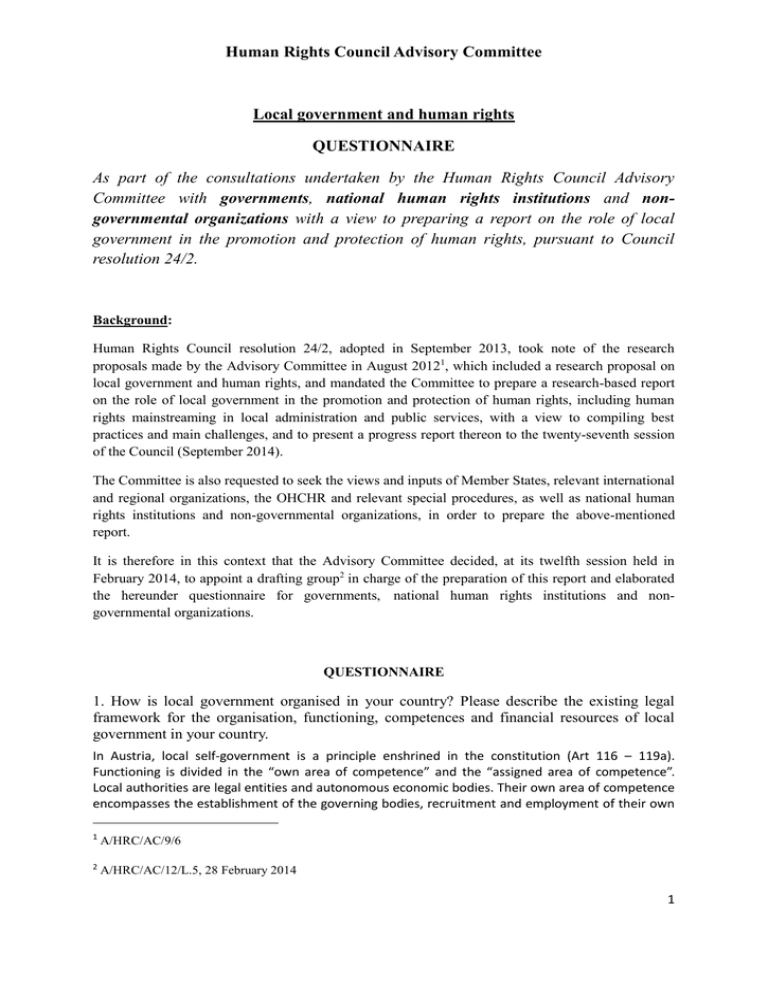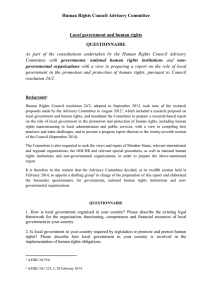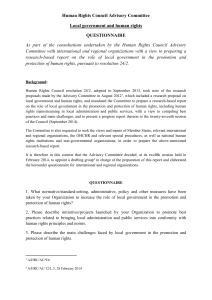Human Rights Council Advisory Committee Local government and human rights QUESTIONNAIRE
advertisement

Human Rights Council Advisory Committee Local government and human rights QUESTIONNAIRE As part of the consultations undertaken by the Human Rights Council Advisory Committee with governments, national human rights institutions and nongovernmental organizations with a view to preparing a report on the role of local government in the promotion and protection of human rights, pursuant to Council resolution 24/2. Background: Human Rights Council resolution 24/2, adopted in September 2013, took note of the research proposals made by the Advisory Committee in August 20121, which included a research proposal on local government and human rights, and mandated the Committee to prepare a research-based report on the role of local government in the promotion and protection of human rights, including human rights mainstreaming in local administration and public services, with a view to compiling best practices and main challenges, and to present a progress report thereon to the twenty-seventh session of the Council (September 2014). The Committee is also requested to seek the views and inputs of Member States, relevant international and regional organizations, the OHCHR and relevant special procedures, as well as national human rights institutions and non-governmental organizations, in order to prepare the above-mentioned report. It is therefore in this context that the Advisory Committee decided, at its twelfth session held in February 2014, to appoint a drafting group2 in charge of the preparation of this report and elaborated the hereunder questionnaire for governments, national human rights institutions and nongovernmental organizations. QUESTIONNAIRE 1. How is local government organised in your country? Please describe the existing legal framework for the organisation, functioning, competences and financial resources of local government in your country. In Austria, local self-government is a principle enshrined in the constitution (Art 116 – 119a). Functioning is divided in the “own area of competence” and the “assigned area of competence”. Local authorities are legal entities and autonomous economic bodies. Their own area of competence encompasses the establishment of the governing bodies, recruitment and employment of their own 1 A/HRC/AC/9/6 2 A/HRC/AC/12/L.5, 28 February 2014 1 Human Rights Council Advisory Committee staff, partly security services, authority of construction and planning, as well as establishment and maintenance of arbitrage bodies (extra-judicial). These functions are deserved independently with supervision by province and federal government/parliament (in respet to rule of law). LA are assigned with maintenance of care, schooling, cultural establishments etc. Finances are regulated in the Fiscal-Constitution Act. 2. Is local government in your country required by legislation to promote and protect human rights? Please describe how local government in your country is involved in the implementation of human rights obligations. Human rights are constitutional rights in Austria. All levels of government are obliged to respect, protect and fulfil human rights as far as ratified when executing their own or assigned tasks. 3. Is there any cooperation between local government and the central government in your country regarding the implementation of human rights at local level? If yes, please describe the existing cooperation framework. This is guaranteed by the application of the rule of law. However, there is no explicit “human rights cooperation”. 4. Do you have human rights protection mechanisms at the local level in your country (e.g. ombudspersons, human rights commissions, mediators, etc.)? All over Austria there are local equality bodies as well as regional commissions of the NPMs (OP CAT). Additionally, there are human rights centres, equality bodies and other institutions established by regional or local governments. Children rights ombuds offices, victims’ support office, violence protection offices and other institutions are established and maintained by law. 5. What initiatives have been taken to include human rights mainstreaming in local administration and public services? There are various, some more, some less successful. Mostly, they are successful when implemented by national or regional law. Successful is the “human rights city council” of the city of Graz, a consultation body for the municipal government, assigned with an annual report, election campaign monitoring, human rights education (for local administration) and employing various working groups. 6. What is the role of civil society in the planning and implementation of activities for the protection and promotion of human rights at local level in your country? Lobbying, advocating, service provision, cooperation with authorities in the implementation. 7. What is the role and programme of your organization for promotion and protection of human rights at local level or in enhancing local governance for human rights? The European Training- and Research Centre on Human Rights (ETC) is delivering human rights training for all professional groups (administration, police, judiciary, educators, etc), students and other groups. Awareness raising within the broader public. ETC is coordinating the city’s (Graz) human rights activities and provides expertise for the local and regional government. ETC is doing research (socio-legal) on human rights topics (e.g. studies on racism, discrimination in housing, violence in prisons). 8. What are the main challenges faced by local government in your country in the promotion and protection of human rights? It is not primarily the “classic” state to individual constellation. Mainly, it is the problematic of living together, the problems between persons: violence against women, every-day racism. However, structural inequality is a hot topic, as well as hate speech by right-wing politicians. 9. Please provide any best practices with regard to the above-mentioned issues. Election campaign monitoring: Due to decades of hate speech during election campaigns and the 2 Human Rights Council Advisory Committee respective hostility against target groups, the human rights city council established this programme. When campaigning starts, a committee is established. All campaigning material and speeches are collected and archived in a data base and then analysed according to its human rights relevance. Three times before the elections expertise are published and presented to the media. After the elections an overall report is submitted to an arbitrage court which has the power to sentence the perpetrators and parties. Sanction is the reduction of public subsidies for the party sentenced. After two cycles, at least the offences against vulnerable groups stopped. Deadline for submission of responses to the questionnaire: In order to give the Drafting Group the opportunity to take into account the different contributions, all parties are encouraged to submit their responses as soon as possible and at the latest by 11 April 2014. Answers can be submitted via email to the following address: hrcadvisorycommittee@ohchr.org OR Secretariat of the Human Rights Council Advisory Committee c/o Ms. Meena Ramkaun Office of the United Nations High Commissioner for Human Rights Palais Wilson, Room 4-060, Fax: +41 22 917 9011 United Nations Office at Geneva, CH-1211 Geneva 10, Switzerland Thank you for your contribution. For more information on the Advisory’s mandate: http://www.ohchr.org/EN/HRBodies/HRC/AdvisoryCommittee/Pages/HRCACIndex.aspx 3

